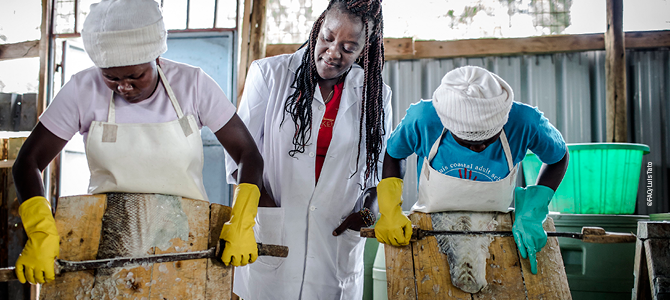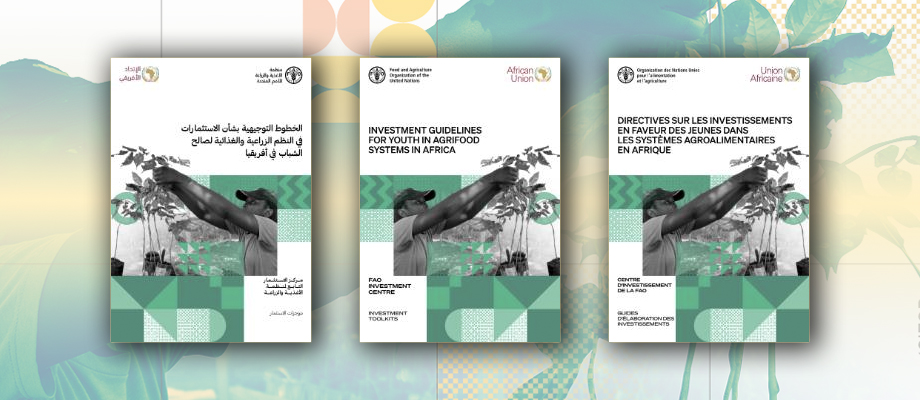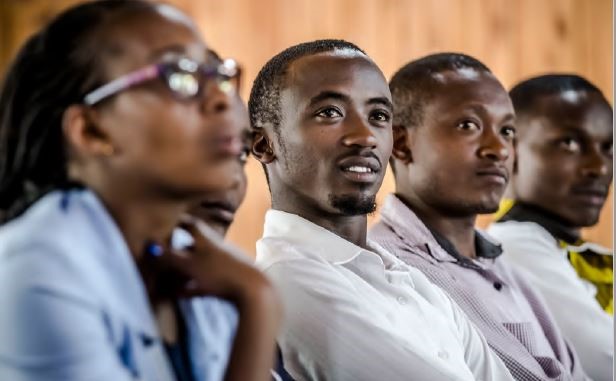New guidelines for scaling up investments in agrifood systems for youth in Africa

The Investment Guidelines for Youth in Agrifood Systems in Africa provides practical “how to” steps to develop youth-focused and youth-sensitive investment programmes that see youth as partners in rural development, throughout all phases of the investment programme cycle. The guidelines are for those involved in designing and implementing agrifood investment programmes: governments, financial and technical partners, the private sector, civil society, and young women and men themselves.
“The Investment Guidelines that we are launching today are a direct response to the call to scale up investments in and with Africa’s youth,” said FAO Director-General Qu Dongyu at the official launch of the Guidelines during the 32nd Session of the FAO Regional Conference for Africa (ARC32), in Malabo. “There is an urgent need to address the gaps and multiple constraints faced by Africa’s young people, particularly in the rural sector. The impacts from the COVID-19 pandemic have raised this urgency even higher,” he said.
“Although political momentum and proclamations to mobilize youth-inclusive investment programmes and interventions are necessary, they are insufficient. We make an urgent call for concrete operational action – the Investment Guidelines for Youth in Agri-Food Systems in Africa has great potential to drive this process and bring investments in youth-focused agri-food systems initiatives to scale’’ said H.E. Amb. Josefa Sacko, Commissioner for Agriculture, Rural Development, Blue Economy and Sustainable Environment of the African Union Commission.
A continent of young people
Africa as a region has the highest percentage of youth in the world, estimated at 420 million people between the ages of 15 and 35. This is an enormous resource for future prosperity, but the challenges these young people face are many.
Young people are twice as likely as adults to be unemployed. The majority of working youth are poor and employed in vulnerable, low-quality jobs in the informal sector. In 2019, almost two-thirds (63 percent) of young workers lived in poverty in Africa compared to half (51 percent) of adults. Youth are also overrepresented among the extremely poor. On top of this, young women, especially in rural areas, face gender-biased social norms, laws and practices that limit their involvement in gainful work and seizing development opportunities.
Agrifood systems transformation can address these challenges, opening up vast employment and entrepreneurial opportunities for young women and men in agricultural value chains and across food systems.

Youth are key to building sustainable agrifood systems
Agrifood systems are under pressure from climate change, chronic and emerging conflicts and the impacts of COVID-19, undermining their ability to provide healthy and affordable food for all. But youth are resilient and innovative. It is crucial to invest differently and engage them as central players driving the transformation of agrifood systems. This includes through expanding automation, digital technologies and the green economy. Young people bring in new ideas, solutions, products and services, new models of entrepreneurship, partnerships and networks. Failing to invest in youth could lead to economic and social costs and threaten agrifood systems' sustainability.
The Investment Guidelines for Youth in Agrifood Systems in Africa aim to accelerate investments in and by youth in agrifood systems. They recommend four steps to investing in youth : 1) Engage youth in the investment programme cycle; 2) Assess and pre-design with a youth lens; 3) Design with a youth lens; 4) Implement then monitor, evaluate and capitalize on what you learn.
FAO and the AUC developed the Guidelines drawing from research, case study analysis of successful programmes, multistakeholder consultations and a widely-attended technical validation workshop.
“Investing in agrifood systems with a youth lens has positive impacts on youth employment and entrepreneurship and is critical to building sustainable inclusive agrifood systems,” said FAO Investment Centre’s Senior Rural Sociologist Pamela Pozarny. “Youth must have an active voice and role as agents for change at all stages of the investment programme. This requires an enabling investment environment,” she said.

Download the Investment Guidelines for Youth in Agrifood Systems in Africa in English, French and Arabic.
An accompanying Investment Brief Scaling up investments in agrifood systems for youth in Africa - What policymakers need to know is also available in Français, Español, العربية

